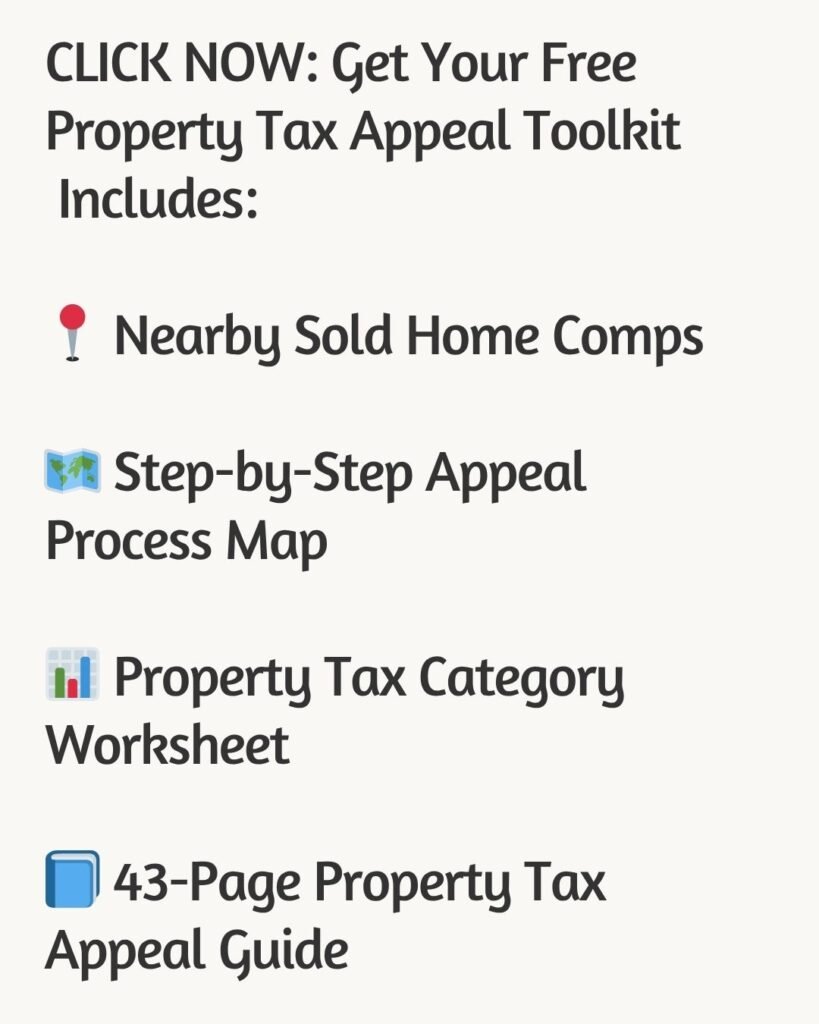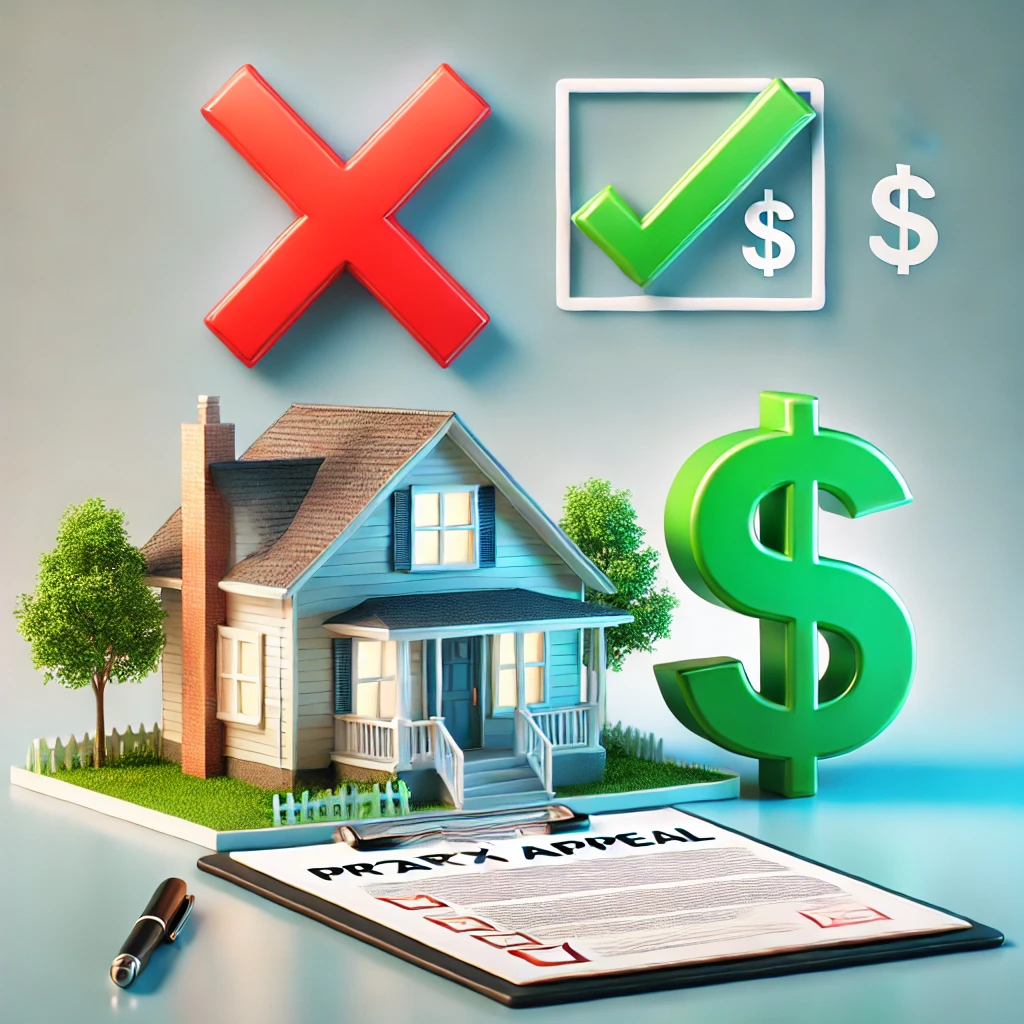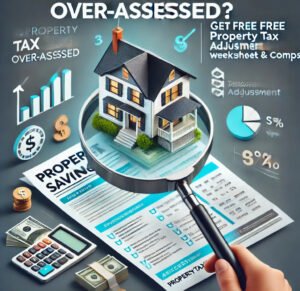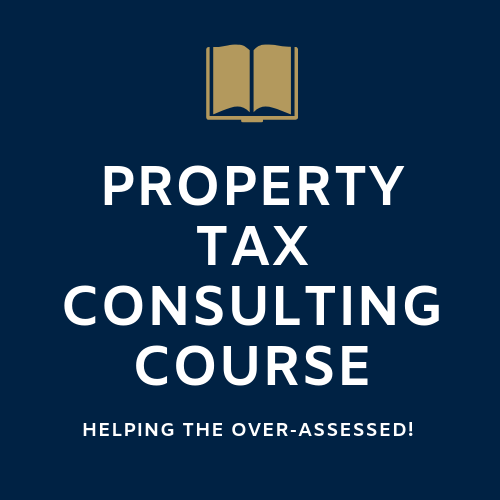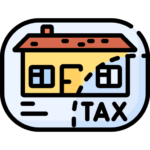Best Real Estate Appraisal & Property Tax Appeal Process:
Evidence: We guide you in finding accurate evidence of a property’s true valuation.
The right facts are crucial, and a well-organized presentation of those facts supports your case will win. We walk you through each step of the process. You’ll be well equipped to win any over-assessed real estate property using the same math, methods and evidence that a licensed professional real estate appraiser would use.
Example: a $11,000 property tax on a home. Usual results in a 20% over-assessment reduction = $2,200 tax reduction. Your contingency fee of 80% nets you $1,760. Homeowner loves you since in 10 years you save that person $22,200! The whole process should take less than 8 hours. Not bad for a days work.
Time to process a expensive home same as a lower priced home. Once you’ve completed a few appeals, you can anticipate a success rate of over 95% and an average property tax reduction of around 20% per successful case. This might just be the most underrated side hustle out there.
Residential and commercial property tax reduction. Challenge an overinflated property tax assessment for yourself or with clients where you earn contingency fees.
More homeowners and business owners than ever are questioning the fairness of their property tax assessments. They are eager to challenge inflated valuations that drain their finances. The demand is surging, yet the competition remains scarce—an untapped goldmine where you can step in as the expert who rights these wrongs.
Each successful appeal using our property tax course isn’t just a win for your client—it’s a win for you. Your reward? A decent contingency fee carved from their tax savings. You’re not just making money; you’re delivering justice, putting hard-earned dollars back into pockets where they belong.
Picture the relief on a homeowner’s face when you slash their tax burden or the gratitude of a business owner who can now reinvest in their future. Beyond the financial gain, you’ll take pride in being the solution to an unfair system. And the best part is that the property tax course process is simpler than you think—dive in and see how easily you can start changing lives while building a thriving side business!
Get Free Tools: Appeal Steps, Adjustment Worksheet, Local Comps & 43-Page Side Hustle Guide!
100% beginner-friendly – no tech skills or experience needed. No property tax consulting license is needed except in Texas.
Bank high 3 to 4 figures in contingency commissions per appeal, even if you’ve NEVER made a dime in this.
The most convenient & FASTEST method to earn payment,s helping the over-assessed. You’ll gain contingency commissions as you learn the real estate property tax appeal consulting business.
Taking the Real Estate Appraisal and Property Tax Training Course will teach you exactly how to appeal your own over-assessed home, and you will also have a lucrative side business. This real estate niche has little to no competition. You will obtain multi-referrals.
- Part-time side business opportunity.
- Superior marketing training.
- Unlimited & highly targeted leads are very easy to obtain.
- No specific market experience required.
- Need 5th-grade math and the ability to converse in English.
Some of What’s Included in the Real Estate Appraisal & Property Tax Appeal Course:
Package #1 (Included with the Course)
ADJUSTMENTS: Main Areas For Property Tax Real Estate Appraisal Adjustments
Locational Adjustments: Differences in neighborhood, noise adjustments, traffic, proximity to amenities, school districts, etc.
Site Variations/ Lot Size: Variations in land area, lot dimensions, topography, or usability of the site.
View: view adjustments, scenic views (water, golf course, cityscape) vs. obstructed or no views valuation instruction.
Design / Style: Differences in architectural design (colonial, ranch, contemporary, etc.).
Quality of Construction: Superior or inferior build quality, materials, finishes, or workmanship.
Condition: Differences in physical condition, such as remodeled, updated, or areas in need of repairs.
Gross Living Area (GLA): Adjustments for square footage differences (above-grade living area only).
Room Count: Differences in the number of bedrooms, bathrooms, or total rooms.
Basement / Finished Area: Presence, size, and degree of finish of basements or lower levels.
Garage / Parking: Number of garage spaces, carports, or off-street parking availability for valuation adjustments.
Heating / Cooling Systems: Central HVAC vs. baseboard heat, window units, or no cooling.
Energy Efficiency / Green Features: Solar panels, energy star ratings, or other eco-friendly features.
Outbuildings / Additional Features: Pools, guest houses, workshops, sheds, barns, etc.
Porches / Decks / Patios: Size and quality of outdoor living spaces.
Functional Design Utility: Layout functionality, floor plan flow, or design obsolescence issues.
Age / Effective Age: Physical or functional depreciation differences based on renovation history.
Legal Restrictions/ Zoning Differences: Property use restrictions, zoning variances, or legal non-conforming issues.
Key Points:
- Adjustments are typically made only when there’s a market-supported difference between the subject and comparable property.
- The goal is to reflect the market reaction to each difference.
- Adjustments can be positive (adding value) or negative (subtracting value), depending on the subject property’s relative advantage or disadvantage.
The course includes actionable resources in property tax adjustment charts, checklists, and data worksheets, along with references to public records and market data sources.
-
Adjustments are typically made only when there’s a market-supported difference between the subject and comparable property. This solid evidence that stands up in court.
-
The goal is to reflect the sold data differences.
-
Adjustments can be positive (adding value) or negative (subtracting value), depending on the subject property’s relative advantage or disadvantage.
Designed by an experienced real estate appraisers and tax consultants, this course empowers homeowners and investors to take control of their valuations, save money, and make informed property decisions. You’ll also learn how to craft a compelling appeal letter and effectively present your case at hearings.
These downloadable PDF templates help you organize your information in a professional, standardized format—just like those used by licensed real estate appraisers. With these forms, you can present your evidence clearly and effectively for a strong appeal.
This complete Real Estate Appraisal and Property Tax Appeal course gives you all the tools and knowledge to uncover a property’s true market value and confidently challenge over-assessed property taxes. You’ll learn core appraisal methods—sales comparison, cost, and income approaches—while gaining hands-on experience with real-world examples, case studies, and sample appeal documents.
After placing your property tax course order, you’ll receive a password to access these essential resources.
Package #2 (Included with the Course)
Ready-to-Use, Professionally Pre-Written Property Tax Course Business Essentials Gain access to a complete collection of pre-written forms, letters, and customer contracts—everything you need to run your property tax consulting business smoothly and professionally, right from day one!
Essential Business Forms & Templates:
-
Sample & Fill-in Fee Agreement Forms – Legalizes the transaction.
-
Advisor/Agency Authorization Forms – Sample & Fill-in.
-
Residential Solicitation Letters – Marketing advertisement aids.
-
Signed Contract Transmittal Letters – Correspondence shortcuts.
-
Client Appreciation Letters – “Thank You for Choosing Our Company” and other acknowledgement letters.
-
Limited Power of Attorney Form – The legal means and right to represent a client form.
-
Appeal Confirmation Letters -“We Have Filed Your Appeal” form.
-
Invoice Form for Services Rendered – Request form.
-
Invoice Cover Letters – “Enclosed Is Your Invoice” form.
-
Past Due Notice Letters – That and more letters and forms.
Everything you need to streamline your property tax appeal business—professionally written and ready to use!
Package #3 (Included with the Course)
Ready to Use Property Tax Appeal Secrets
Ready-to-Use, Pre-Written Property Tax Consultant Insider’s Marketing Plan Unlock a proven marketing blueprint designed specifically for property tax consultants. This step-by-step plan equips you with the strategies and tools to attract clients, grow your business, and maximize your earnings—without the guesswork!
Package #4 (Included with the Course)
Yearly Updates – Lifetime Access to Expert Property Tax Appeal Insights. Stay ahead of the game with ongoing access to the latest research, strategies, and expert advice on property tax appeals—ensuring you’re always equipped with up-to-date knowledge to succeed!
Package #5 (Included with the Course)
Ready-to-Use Persuasion Strategies & Sales Course eBook:Ready to use Property Tax Course Persuasion Sales Letters & Copywriting Course (Included with the Course)
Ready-to-Use Persuasion Strategies & Sales Course: 110 page eBook course. Master the art of influence with this pre-written guide packed with powerful persuasion tactics and compelling sales copy for your property tax course future business—designed to help attract clients and close deals effortlessly!
Ready to use Property Tax Course Persuasion Sales Letters & Copywriting Course: 136 page eBook course that can help marketing your business. If you can’t persuade people to buy, your business will struggle to grow. Have you ever wondered if the missing link to your success is simply knowing how to write compelling, persuasive copy? What if the key to reaching a whole new level of success lies in mastering the art of powerful marketing copy?
You can obtain full access to the commercial and industrial property tax appeal program for just an added $42.
Package # 6: Commercial Real Estate Real Estate Tax Appeals Using The Income Method – The Commercial Business Real Estate Tax Appeal Valuation Course
- Industrial Assessment Tax Consultant Essentials — Master the fundamentals of industrial property tax consulting.
- Commercial Valuation Tax Obligation Course — Gain specialist skills to reduce real estate tax over-assessment costs.
- Commercial Equity Evaluation — Uncover hidden financial savings through equity-based tax appeals.
- Commercial Fair Market Value Evaluation — Precisely evaluate market valuation worth for a stronger tax appeal.
- Commercial Business Price Analysis — Break down costs to test over-assessed residential or commercial properties.
- Commercial Operating Statement — Analyze accounting financials for factual backup for your real estate tax appeal case.
- Commercial Business Supplement To Operating Declaration Strengthen that property tax appeal using additional financial insights.
- Business Land Appraisal Evaluation — Determine land value for exact tax assessment valuation.
See How One Owner Cut Their Commercial Property Tax Bill—And Imagine the Contingency Fee You Could’ve Earned.
If you’re thinking about a financially rewarding opportunity in the commercial industrial real estate tax appeals niche, the example listed below deserves discovering.
Normally, for commercial property tax appeals, contingency fees for these services range from 30% to 50%. The contingency commission is a portion of the tax savings that was accomplished.
Here a lower valuation results in a lower tax obligation and financial savings for the proprietor.
Below’s an illustration: A firm owns a business and building valued at $27 million, which they think is misestimated. They hire a tax consultant on a contingency basis.
Original Evaluated Worth: $27,000,000.
- New Assessed Value (after successful appeal): $23,000,000.
- Decrease in Assessed Value: $4,000,000.
- Real Estate Tax Appraisal Percentage: 2.5%.
- Yearly Tax Cost Savings: $4,000,000 × 2.5% = $100,000.
Contingency Cost Agreement: 30% of initial year’s tax savings.
Total contingency compensation determined: 30% of $100,000 = $30,000.
In this scenario, the tax specialist would get $30,000 as their settlement for a successful property tax appeal. Not bad for a few days work (tabulating total hours worked on the project). This might just be the most underrated side hustle out there.
Get Free Tools: Appeal Steps, Adjustment Worksheet, Local Comps & 43-Page Side Hustle Guide!
Commercial Property Tax Assessment Training
What matters most in a commercial property tax appeal course? Results. Everything else is secondary.
The commercial sector offers a wealth of opportunities, dealing with larger properties—and, naturally, larger commissions. Unlike residential properties, commercial valuations rely on the Income Approach, meaning if a property generates less income than the previous year, its tax assessment should reflect that decline.
In this specialized field, you’ll uncover a range of opportunities. Strip malls with vacancies, apartment complexes with high turnover, or struggling small-to-medium businesses—each one may be ripe for a tax appeal, especially when their income has dipped. These properties aren’t valued based on market comparisons like residential properties, but rather on their income potential.
When cash flow is down or tenants are few, you may have just found a client who could benefit from significant tax savings.
By helping businesses secure the tax breaks they deserve, you’ll be offering a rare and highly valuable service in a market where competition is limited—while positioning yourself for a rewarding career in commercial property tax consulting.
In a course designed to challenge over-assessed commercial properties, the single most important factor is whether it consistently delivers successful appeal outcomes..
Residential Property Tax Appeal Training Course
The opportunities in residential property tax appeals are endless. You’ll quickly discover there’s always a steady stream of overvalued assessments to correct, not to mention the constant flow of referrals from homeowners seeking to lower their tax burdens.
Studies show that assessment errors are far more common than you might think, making it clear that clients will always be in demand. As long as property taxes exist and real estate market values fluctuate, you’ll find an abundance of cases where the homeowner’s assessment is simply wrong.
Taking on these tax appeals isn’t just a business opportunity—it’s a chance to make a real difference by championing fairness and securing tax breaks for those who deserve them.
And remember: the bigger the tax bill, the greater the reward for you and your clients!
Property Tax Appeal Course and How To Start A Property Tax Consulting Business
Unlock the power of property tax appeals with our Property Tax Appeal Course—your step-by-step property tax course guide to reducing property tax bills for yourself or your clients.
Whether you’re a homeowner looking to fight an unfair assessment or an aspiring consultant ready to build a lucrative business, this course covers everything from analyzing assessments to presenting compelling evidence for a successful appeal.
Plus, if you’re looking to start a Property Tax Consulting Business, this property tax course gives you the insider knowledge, tools, and strategies to turn expertise into profit. With rising property taxes, demand for skilled consultants is growing—position yourself as a trusted expert and create a business that helps others save thousands while securing your financial future.
Click any image below for more info.


